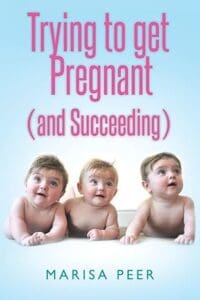
Overcoming Infertility: Top Infertility Solutions
Infertility affects many couples. It is as tough emotionally as it is physically. I know this firsthand. I’m a mom of twins who spent 4.5 years on my own fertility journey. The struggle to conceive can feel very lonely. But, there are many solutions that can help. Infertility isn’t just about physical factors. Mental and emotional aspects matter too. This article will cover the five best infertility solutions. They have shown real results. They include lifestyle tweaks, stress management, and mental health support. If you’re on this journey, these tips might be what you need to help you move forward.
Understanding Infertility – Common Causes of Infertility
A variety of factors, both physical and psychological, can cause infertility. It’s essential to recognize these factors to address them effectively.
Physical Factors
- Endometriosis: This condition occurs when uterine grows outside the uterus. It causes pain and can lead to infertility.
- Fibroids: Noncancerous growths in the uterus can interfere with conception and pregnancy.
- PCOS (Polycystic Ovary Syndrome): A hormonal disorder causing enlarged ovaries with small cysts on the outer edges.
- Irregular Periods and Lack of Ovulation: These issues can prevent the regular release of eggs necessary for fertilization.
- Poor Quality Semen and Low Testosterone: Male infertility factors that can affect the chances of conception.

Psychological Factors
- Stress and Anxiety: Chronic stress can affect hormone levels and ovulation.
- Negative Thought Patterns: Persistent negative thinking can impact mental and physical health.
- Depression and Mood Swings: Emotional health affects physical health. Depression can hurt fertility.
- Infertility can cause great distress. This can worsen physical issues and create a cycle of stress and infertility.
The Impact of Infertility on Mental Health
Infertility doesn’t just mess with your body—it really hits you emotionally too. The struggle to conceive and the heartbreak of setbacks can take a huge toll on you and your partner. Society, and ourselves, can pressure you to have kids. It can make you feel inadequate and frustrated.

Chronic stress can really throw women’s hormones out of whack and mess with ovulation, making it harder to get pregnant. But infertility isn’t just a physical struggle—it’s an emotional rollercoaster for both partners. The constant pressure to conceive, mixed with the heartbreak of setbacks, can weigh heavily. The stress, anxiety, and feelings of inadequacy can build up, and add pressure to personal expectations to have kids. It’s a tough cycle because the more stressed you are, the harder it can be to conceive.
For men, stress can affect physical processes. It can cause problems with erections, a low sperm count, or orgasms. Infertility affects both partners in different ways. It’s vital to address both the physical and emotional aspects of this journey. Managing stress and the emotional toll can help. It can create a more positive space for conception. This can boost your chances of success.
At the end of the day, intimacy with your partner should be enjoyable and fun. It should foster a deep connection. It should not feel like a chore or a source of anxiety about whether it will work.
Top Infertility Solutions
To tackle infertility, it’s important to take a well-rounded approach that combines both medical and holistic treatments. Here are five solutions that many have found helpful.
Infertility Solution 1) Medical Treatments and Interventions for Infertility

Medical treatments like In Vitro Fertilization (IVF) can be a lifeline for many people struggling with infertility. IVF works by stimulating the ovaries to produce many eggs. These eggs are then retrieved and fertilized with sperm in a lab. After monitoring the embryos for a few days, we implant the healthiest ones into the uterus. IVF is a common fertility treatment. Its success depends on age and health. So, it’s essential to consult a fertility specialist for expectations.
There are hormonal treatments beyond IVF. They can help with irregular ovulation and hormonal imbalances in you or your partner. Medications like Clomiphene Citrate or Gonadotropins are often used to stimulate ovulation and boost your chances of getting pregnant. But like any treatment, they can have side effects—things like mood swings, hot flashes, or ovarian hyperstimulation syndrome. For men, hormonal imbalances can cause problems like erectile dysfunction, reduced libido, or even infertility. Navigating these options can feel overwhelming, but working closely with a specialist can help you find the right path forward.
Infertility Solution 2) The Role of Lifestyle Changes in Enhancing Fertility
Some small changes to your lifestyle can boost fertility. It starts with a balanced diet. A load of essential nutrients can help. Folic acid, vitamin D, iron, omega-3s, and antioxidants are key. They support your health and boost your chances of conceiving. But it’s not just about what you eat. Make physical activity a routine part of your daily life. Maintain a healthy weight. Cut caffeine, alcohol, and ultra-processed foods. These changes improve your physical health. They also help create a better environment for conception, aiding your fertility journey. By focusing on these lifestyle adjustments, you’re setting yourself up for a much better shot at a healthy pregnancy.

Regular Exercise and Maintaining a Healthy Weight
Staying active is closely tied to reproductive health. Regular exercise not only helps you maintain a healthy weight but also reduces stress and boosts your overall well-being. Activities like walking, swimming, and yoga are great options—they’re effective without being too intense.
Stress Management and Mental Health Support
We can’t overlook the impact stress and mental health have on fertility. Tackling these areas can do wonders for your overall well-being and increase your chances of conceiving. Stress management techniques like meditation and mindfulness are fantastic for keeping stress levels in check and helping you stay calm. Also, make time for hobbies you love. They can relieve stress from trying to conceive.
Infertility Solution 3) Enhancing Emotional and Relationship Health
Also, make time for hobbies you love. They can relieve stress from trying to conceive. The journey can be tough on your emotions. So, it’s vital to keep your relationship strong and healthy. Being open and honest with your partner about what you’re both going through is key. Sharing your feelings, worries, and fears helps you connect. It also supports each other through hard times. Even simple acts of love can make a big difference. They help you stay positive and close as a couple. Prioritizing your emotional health and your relationship can help. It will help you cope with the ups and downs of trying to conceive. You will be stronger and more understanding, knowing you’re in it together.

You might find these books helpful:
They offer great advice on strengthening your relationship during challenging times.
A couple, after many fertility struggles, found a key to conceiving. They needed to heal emotionally and address hidden mental blocks. For more insights, you can check out the research from Translational Research or the article from the American Psychiatric Association.
How RTT® Can Help
Infertility is a very stressful, draining experience. While IVF and lifestyle changes are vital, so is the emotional side. We must focus on the psychological aspects too. Stress, anxiety, and beliefs about your worth can harm your mind and body. They can even hurt the success of medical treatments.
That’s where RTT® (Rapid Transformational Therapy) comes in as a powerful complement to your fertility journey:

- Tackling Emotional Blocks: RTT® helps you find and remove harmful, subconscious beliefs. They may be holding you back. Fears about parenthood, past traumas, and feeling unworthy can reduce your chances of conceiving. RTT® shifts these beliefs. It creates a mindset more supportive of conception. By shifting these beliefs, RTT® creates a mental space that’s more supportive of conception.
- Cutting Down on Stress and Anxiety: Chronic stress and anxiety can seriously mess with your fertility. RTT® addresses these feelings. It helps you relieve stress and relax. This state is better for conception.
- Boosting Confidence and Well-being: The infertility journey can feel overwhelming. RTT® can boost your self-esteem and confidence. It can help you face the process with a positive mindset. This may be the key to your success.
- Supporting Wellness: RTT® is about mental and emotional healing. Your mind-body connection means that better mental health can improve your physical health. This may make other infertility treatments more effective.
If you’re looking for more guidance, check out Marisa Peer’s book, Trying to get Pregnant (and Succeeding) . It’s a great resource for anyone on this journey.
Conceiving Against All Odds
It felt like everyone around us was getting pregnant with ease. They would think about it, and then they were expecting. Meanwhile, we were struggling, trying to understand why it wasn’t happening for us.
We explored every avenue, we visited OB-GYNs and fertility clinics, hoping to find answers and a solution. We even faced the chance of moving beyond IVF, with no guarantees it would work. The journey was emotionally draining, filled with tears and frustration. Intimacy started to feel like a chore, something we had to do rather than a way for us to connect as a couple. But through it all, our shared challenges, heartbreaks, and hopes deepened our bond.
Belief & Stress
Two things stood out to me during this journey—belief and stress. Our OB-GYN told us, “It only takes one.” Just one egg, just one sperm. That simple truth became a beacon of hope and one I didn’t realize would be so profound. Then, at the fertility clinic, we learned about the impact of stress on conception. They emphasized how high stress levels could hinder our chances of getting pregnant. Running a business in the Home Medical Equipment industry can be very stressful. We decided to take a step back and focus on reducing stress. Instead of diving into a fertility plan, we took a vacation—a chance to relax, reconnect, and just be together.
To our astonishment, that vacation resulted in a pregnancy. It was a bittersweet moment, as that pregnancy ended in a miscarriage. But from that loss, we gained something invaluable: the belief that we could conceive on our own. We decided to try for another year. If it didn’t work, we’d start hormone injections. Five months later, I was pregnant again.
This journey taught us so much about belief. The belief that we could do this, that we could get pregnant, was powerful. But it also taught us about the pain of loss and the strength it takes to keep going. My husband, who had been so supportive, admitted that he only wanted to go through this once. The pain of infertility, the fear of disappointment, was something he didn’t want to relive.
Shock & Awe

At eight weeks, I went in for an internal exam. My doctor noticed that I was larger than expected for my dates and recommended an ultrasound. On a fertility journey, you know all your dates, so I assumed I was just carrying a large baby. But at 11 weeks, during the ultrasound, we experienced a moment of sheer amazement. As the technician moved the wand over my belly, she showed us our baby’s heartbeat. After the heartbreak of a miscarriage, seeing that tiny heartbeat was an incredible relief. Then, she moved the wand again and revealed a second heartbeat. We were in shock—how was it possible that without any treatments, we were pregnant with twins?
The technician reassured us that it was an identical twin pregnancy, and everything looked amazing. But with twins, our pregnancy was now considered higher risk. We went back to the same OB-GYN who had told us, “It only takes one.” At each of our next three appointments, he asked me which fertility treatment I had undergone. He was surprised every time I told him there had been none. “It only takes one,” I reminded him. That belief had somehow led us to this incredible outcome.
The Journey Forward
Infertility is a complex challenge that affects your body, mind, and emotions all at once. To navigate this journey, we must take a well-rounded approach. It should cover all these areas. Medical treatments like IVF and hormonal therapies are often essential. But they work better with lifestyle changes—think balanced meals, exercise, and rest.
Just as important is taking care of your stress levels and emotional health. Mindfulness, meditation, and therapies like Rapid Transformational Therapy (RTT) can help. They can clear mental blockages and keep your mindset positive. To conceive, focus on your well-being. Nurture your relationships. Create a supportive environment. It can make all the difference.
If you’re struggling with infertility, you’re not alone. Many resources can help you. A holistic approach can boost your chances of conceiving. It can also improve your mental and emotional well-being. Keep hope alive. Reach out for support. Explore options for your journey to parenthood.
Book a 30-Minute Discovery Call
Disclaimer: The information provided here is for general guidance and informational purposes only. It is not intended to replace professional medical advice, diagnosis, or treatment. Always consult with a qualified healthcare provider regarding any medical concerns or conditions. The advice shared is based on general knowledge and should not be considered a substitute for personalized medical care.
As an Amazon Associate, I earn from qualifying purchases. This helps support the content and services provided here. Thank you for your support!
